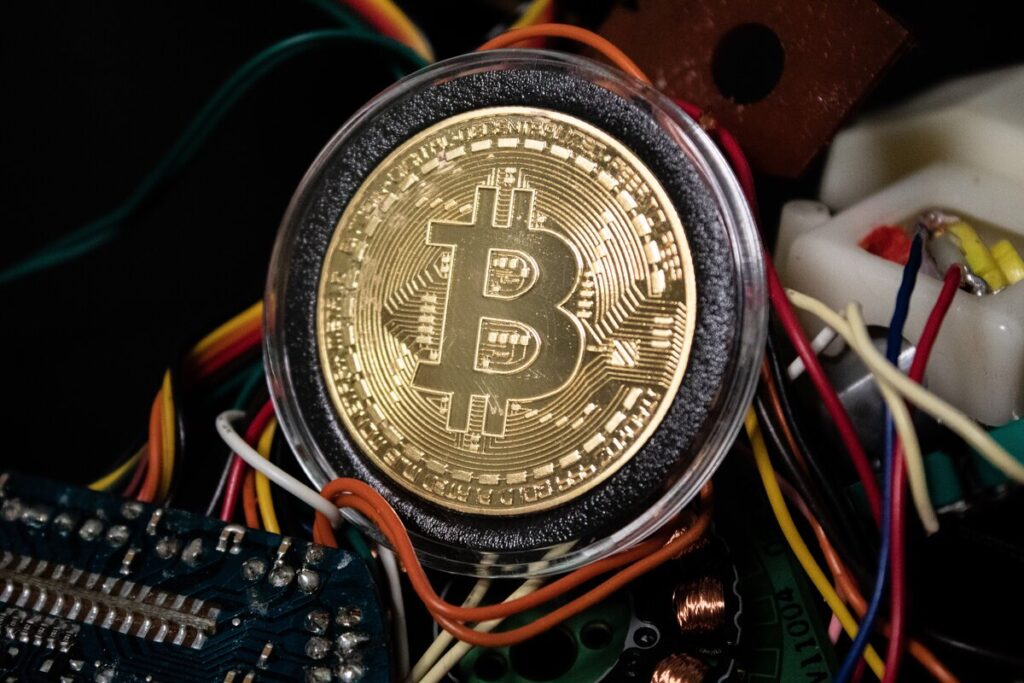Cryptocurrency mining is the process by which transactions on a blockchain network are validated and added to the public ledger.
This process is essential to the functioning of a cryptocurrency, as it ensures the security and reliability of the network by preventing double-spending and other forms of fraud.
How does mining work?
In order to understand how mining works, it is first necessary to understand the basics of blockchain technology and the terms that make up crypto mining.

It is important to note that it is not possible to discuss crypto or bitcoin mining without the understanding of some of the key terminologies that are unavoidable. They include:
- Blockchain,
- Miners,
- Ledger,
- Network,
- Miners,
- Proof-of-work,
Blockchain in relation crypto mining
A blockchain is a distributed ledger that records transactions on multiple computers, known as nodes, in a network.
Each node maintains a copy of the ledger and adds new transactions to it through a process known as consensus.
How does Bitcoin mining work?
In the case of a cryptocurrency like Bitcoin, the blockchain is used to track the ownership of units of the currency.
For instance, when a user in Vermont wants to send some of their Bitcoins to another user in North Carolina, the Vermont user creates a transaction that transfers ownership of the coins from their own address to the recipient’s address who is the North Carolina user.
This transaction is then broadcast to the network, where it is verified by other nodes and added to the blockchain.
Proof-of-work
In cryptocurrency mining, a proof-of-work is a type of algorithm that is used to confirm transactions and produce new blocks on a blockchain.
It is designed to be difficult to compute, but easy to verify, and is used to prevent fraud and ensure that only legitimate transactions are added to the blockchain.
In proof-of-work systems, users who want to add a new block to the blockchain must first solve a complex computational problem, which is known as “mining.”
They rewarded the user who solves the problem first with a small amount of cryptocurrency. This process helps to secure the blockchain and prevent unauthorized changes to the ledger.
This is exactly where mining comes in. In order to ensure that the transaction is valid, and that the sender actually has the funds they are trying to transfer, the network requires that the transaction be verified by a process known as proof-of-work.
It involves solving a complex mathematical problem, known as a cryptographic hash, that requires significant computational power to solve.
Who are cryptocurrency miners?
Cryptocurrency miners are individuals or companies that use specialized computer hardware to verify transactions on a blockchain.
In return for their services, miners are rewarded with a certain amount of the cryptocurrency that they mined.
As we earlier pointed out in the intro of this article, mining is an important part of the cryptocurrency ecosystem.
Mining helps to maintain the integrity of the blockchain and ensures that the cryptocurrency remains secure and decentralized.
In other words, miners are individuals or organizations that run specialized software on powerful computers to solve these cryptographic hashes and verify transactions. When a miner successfully solves a hash, they are rewarded with a certain number of units of the cryptocurrency, as well as any transaction fees that may be associated with the transactions they have verified.
What happens if more miners join the network?
As more miners join the network, the difficulty of the cryptographic hashes increases, requiring even more computational power to solve.
In essence, this means that mining is a highly competitive endeavor, and requires significant investment in specialized hardware and electricity to be profitable.
In addition to verifying transactions, mining also plays a critical role in the security of a blockchain network.
By requiring miners to solve cryptographic hashes, the network ensures that it is very difficult for a single actor to control a majority of the network’s computational power.
This makes it virtually impossible for a malicious actor to take over the network, as doing so would require them to have a significant amount of computing power at their disposal.
What is the energy consumption of Bitcoin mining?
Crypto mining can be a very energy-intensive process, depending on the type of cryptocurrency being mined and the method used to mine it.
Some estimates suggest that the total power consumption of the crypto mining industry is 0.5 percent of all power consumption globally.
It is predicted that the electricity consumption of cryptocurrency mining could be over 7 gigawatts, according to ScienceDirect report. That is equivalent to the power consumption of a small country.
Why does mining consume large electricity?
This power consumption is largely because crypto mining requires a lot of computing power, which in turn requires a lot of electricity.
It’s also worth noting that the power consumption of crypto mining can vary greatly depending on several factors, including the type of hardware being used and the efficiency of the mining process.
Conclusion:
In the crypto sector, we need a high level of security to prevent hack in crypto, unfortunately; it is one of the problems facing the ecosystem since launch of the first crypto : Bitcoin.
Overall, mining is an essential part of the cryptocurrency ecosystem, providing the mechanism by which transactions are verified and added to the blockchain, and ensuring the security and reliability of the network.
There can not be crypto trading if there are no miners. In essence, miners keep the crypto ecosystem flourishing.
While mining cryptocurrency can be a costly and competitive endeavor, the rewards for successful miners can be significant, making it an attractive prospect for those with the resources and expertise to engage in it.
To mine a bitcoin, you need power.
